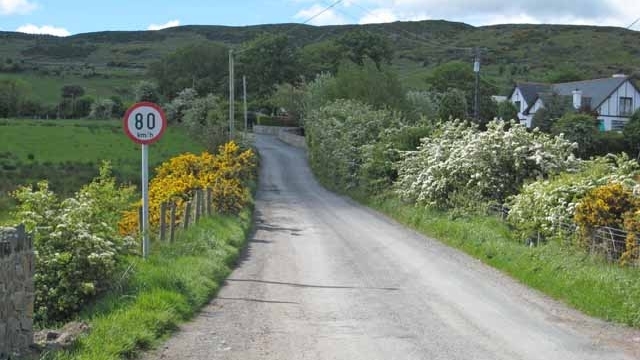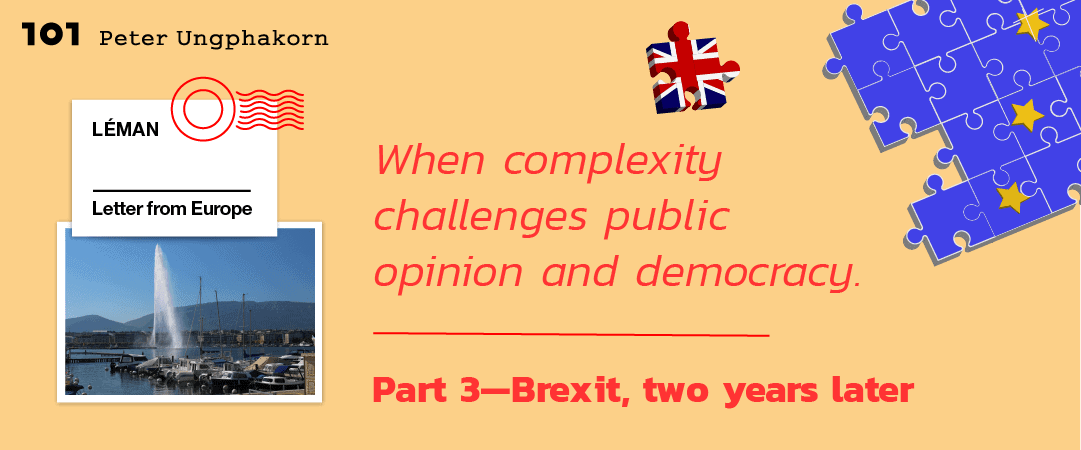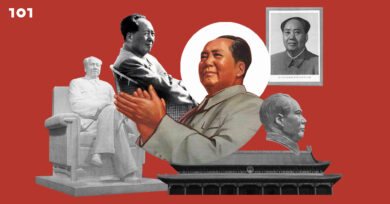Peter Ungphakorn

[/et_pb_text][et_pb_text admin_label=”box” _builder_version=”3.0.106″ background_color=”#eaeaea” background_layout=”light”]
“A lot of confusion arises from the way ‘Brexit’ has come to describe two very different things. It can be heroic liberation from foreign control — a common British definition. Or it can be the task of dismantling the UK’s membership of the European Union, in which heroism plays no part. That is how it is generally understood abroad.
“They sound the same and are spelt the same way, but the meanings have diverged so far that really they should be separate words. One is an event, the other is a process. One is booked for 29 March 2019; the other will drag on for a decade or more. One is a fantasy, the other is a negotiation. Fantasies tend to be non-negotiable.”
— Rafael Behr, The Guardian, June 11, 2018
[/et_pb_text][et_pb_text _builder_version=”3.0.106″ background_layout=”light”]
Tomorrow — June 23, 2018 — is exactly two years after the British public voted by 51.9% to 48.1% to leave the European Union (Brexit). The choice offered voters was simple: “leave” or “remain”. The implications are mind bogglingly complicated.
It has taken those two years for the British government to admit one crucial fact: leaving the EU is not a simple single act.
Rather, it involves unravelling countless tangled issues and dozens of contradictory objectives. No solution is possible without at least modifying some positions that were supposed to be immovable “red lines”. And now, the UK has less than a year left to untangle all those issues before it is due to leave the EU on March 29, 2019.
This is the concluding part of a series on the challenge of complexity in public policy-making. The previous two parts looked at access to medicines and the Trump trade war.
This one looks at Brexit, the biggest and most complex issue facing Britain for generations, and asks whether the media help or hinder our understanding, when politicians hide the complex truth behind slogans and other simplifications.
For many advocates, Brexit was all about “taking back control”, a favourite 3-word slogan.
Leaving the EU would free up billions of pounds, which could be spent on the National Health Service instead of the EU. Immigration from the EU would be limited. The European Court of Justice would no longer have a say in British law.
The UK would no longer have to abide by EU rules and regulations and its companies would be freed from red tape. The UK would be free to strike its own trade deals with the rest of the world. It would be free from those “foreigners” in Brussels (many of them were actually British, but that was conveniently ignored).
It turns out none of that is possible, at least in the short to medium term. The reasons are too complex to explain here. Even the UK negotiating its own free trade deals will require EU participation. (See for example, this Sussex University blog, this Guardian article, and this reaction to Prime Minister Theresa May’s latest claim that she can boost health funding by using Brexit savings.)
The idea that the UK had no “control” in the EU was also a simplification. All member states have a say in EU decisions and the UK as one of the larger members had a particularly strong voice.
Another simple 5-word slogan is “the will of the people”. It refers to the referendum result when voters were offered a binary choice: to leave or to remain. The slogan is in a headlong collision with reality. Voters were never asked, and never said, what type of Brexit they wanted — what future the relationship with the UK’s close neighbours and largest trading partner should be.
Among pro-leavers, opinions actually differ considerably, and yet many claim that theirs — usually the hardest break with the EU — was the version the public voted for. Worse, many pro-leave politicians had campaigned saying the UK should stay in the EU single market or have a closely integrated arrangement similar to Norway’s. They are now denying they ever said that.
So, two years after the referendum, the hugely complicated process of deciding what Britain’s future relationship with the EU will be has barely begun. The UK and EU are now planning a “transition” from Brexit day next March until the end of 2020, but many believe that will not be enough either.
And meanwhile the British government is facing its biggest domestic crisis since the referendum. Time is now running out for premier May. She can no longer delay biting the bullet.
The ERG hard brexit outlook in a nutshell. @adampayne26 @AdrianYalland @StevePeers @chrisgreybrexit @SamuelMarcLowe @Lorand_Bartels @CoppetainPU pic.twitter.com/CwyFBiMy74
— EFTA 4 UK (@EFTA4UK) June 13, 2018
Crunch time
For months May has kept together her Conservative Party — and protected her own position since the party no longer has a majority in Parliament — by adopting an ambiguous approach to Brexit designed to pacify both Eurosceptics and Europhiles. She has faced rebellion and the threat of resignations in her divided Cabinet, but kept ministers on-side by delaying until the last minute any crunch decisions.
She now has to bite the bullet and make specific proposals to Brussels and will no longer be able to please all factions. And already some are accusing her of breaking promises she made to them.
Little by little the government has acknowledged the numerous complications, and recognised that many fanciful ideas will be rejected by the EU. Gradually it has watered down its promises.
Even the idea of restricting immigration has proved problematic because foreign workers are needed for the National Health Service and much of industry and agriculture — from highly trained doctors, nurses and engineers to construction workers and fruit pickers.
Ministers have contradicted themselves without admitting that they hadn’t understood what was involved, and that they are still learning after all this time.
Only last October International Trade Secretary Liam Fox was still claiming that he could instantly “roll over” the EU’s present free trade agreements (with Canada, South Korea and many others) into the UK’s. “Believe me we’ll have up to 40 ready for one second after midnight in March 2019,” he said.
Now the government acknowledges it will be after the transition at the earliest. The minister has never admitted he was wrong.
The conflicting interests of agriculture, the fishing industry, vehicle makers, aerospace, financial services, patients needing isotopes for diagnosis and treatment, and many others have become clearer. May’s simple 5-word promise of a “Brexit that works for all” is simply impossible when there are obviously winners and losers. Equally muddled is opposition leader Jeremy Corbyn’s “jobs first” slogan since Brexit means some jobs will inevitably be lost.
A few of those in favour of leaving the EU have from the start understood the complexity and argued for Brexit arrangements that take that into account. And on the other side of the coin, some on the “remain” side also over-simplified.
https://twitter.com/OliverNorgrove/status/978602336078761985?ref_src=twsrc%5Etfw
One crucial — and for many, unexpected — political issue could make or break Brexit: the Irish border.
After Brexit, it will become the only land boundary between the EU (Republic of Ireland) and the UK (Northern Ireland). Since 2005 it has been invisible: no checkpoints, no customs posts, no cameras for reading vehicle number plates, no infrastructure of any kind. Nothing except innocuous signposts and speed limits that switch between km/h (the Republic) and mph (UK).
— The Irish Border (@BorderIrish) March 25, 2018
Keeping it invisible is necessary to preserve the Good Friday Agreement, which ended centuries of bloodshed when it was signed just over 20 years ago on April 10, 1998. The situation is still fragile. (Look at the border in four minutes of this video, from here. Or see just how fragile it is by watching the whole of the hour-long, moving personal story by comedian Patrick Kielty whose father was killed in the conflict).
In December 2017, the UK and EU agreed that there would be no hard border.
But how? The UK has to uphold that agreement and is hoping to find a technological solution but so far none has been found.
Without that either Northern Ireland or the whole of the UK will have to stay more or less in the EU’s customs union and closely match many of its regulations in order to avoid border checks. That would mean handing a lot of decision-making back to Brussels, but this time with the UK having less say than as an EU member. (This complicated issue is explained by the excellent Institute for Government, here, and by Channel 4 TV, here.)
Bias against understanding?
The challenge for the public is how to make sense of all of this. Many who voted for Brexit are fed up with the endless wrangling among British politicians and say the UK should “just leave”. Many struggle to understand that leaving the EU is extremely complicated, and doing so immediately without any deal with the EU (the hardest of “hard” Brexits) would cause a massive shock to the economy and other areas of British life.
Many have a patriotic belief that whatever happens Britain will thrive. Some politicians feed that sentiment with the Trumpian line of making Britain “great again”.
If we are not experts in a complex subject, we need the media to help us understand. The right-wing British tabloids are doing the exact opposite (see the Sun and Daily Express here).
Even for those media that try to be impartial, helping us really understand is a challenge.
The first hurdle is for journalists themselves to understand. Then comes the question of impartiality.
This is particularly difficult when complexity is also seen as a tool to subvert a decision. In Britain, many Brexiters dismiss anyone discussing the complexity as just making an excuse to prevent Brexit.
On April 4, the Brexit Committee of the House of Commons (lower house) released a report urging the government to continue to press for some kind of close economic relationship with the EU after Brexit (a “soft” Brexit), even if negotiations stall.
Jacob Rees-Mogg is a dissenting member of the committee. He heads the hard-line pro-Brexit European Research Group (ERG) of Conservative MPs. He tweeted: “Another Exiting the EU select committee report that merely seeks to stop Brexit.” In fact the report was all about what kind of Brexit to aim for, not to stop it.
https://twitter.com/Jacob_Rees_Mogg/status/981305874575699969?ref_src=twsrc%5Etfw
(Rees-Mogg was accused of hypocrisy when his investment company set up a subsidiary in Dublin — ie outside the UK but in the EU — and warned of the financial risks of Brexit, which Rees-Mogg himself has never acknowledged. He denied the move was related to Brexit.)
This is a particular problem for the national broadcaster, the BBC. We can expect either side to attack it for being pro-Brexit or pro-Remain. But some argue that its real bias is against expertise and understanding.
The print media and their online versions are not so bad. But in Britain their readership tends to be based on the political lines they take, so a lot of what they write is slanted towards their like-minded audience. Television and radio reach a wider and more diverse audience.
The argument boils down to this. The BBC justifiably interprets neutrality to mean if it gives airtime to one point of view, it should balance that with the other side.
But there are problems with that approach too. Take one recent broadcast.
Overwhelmingly economic research has shown that Brexit will hurt the British economy by slowing down growth. Some studies show that the areas hit worst could be those with the largest Brexit votes — no surprise since the vote was partly about economically vulnerable areas feeling left out.
In this particular radio programme, the BBC interviewed an economist who had just produced the results of in-depth research. It then “balanced” the interview with a pro-Brexit MP who simply dismissed the report because economic forecasts are often “wrong”. The programme and the MP made no effort to probe where the research might have been wrong. It was all about liking or disliking the outcome.
As far as the programme was concerned proper research and gut feeling were equal so long as they were in opposite directions.
The BBC website does just that in its story about May’s claim she can use savings from Brexit to increase funding for the National Health Service. It’s just “she said, he said” with no explanation. It links to an economist’s counter-argument but doesn’t even bother to quote a key figure in that rebuttal, the £15 billion per year of revenue the government itself expects to lose because of Brexit. (BBC radio and TV coverage was better, though.)
This imbalance over expertise has provoked a stream of criticism, such as this long piece by London University professor Chris Grey.
Or this, by Oxford economics professor Simon Wren-Lewis. He wrote: “Unfortunately, with the exception of Sky News, the standard of reporting by broadcasters on Brexit has been very poor.”
“In particular the BBC treats Brexit like any other Westminster-based issue, with an additional touch of nationalism. We hear a great deal from [Prime Minister Theresa] May, [International Trade Secretary Liam] Fox, [Foreign Secretary Boris] Johnson etc, with virtually no expert analysis of what the true state of negotiations are.”
In an earlier article he quoted two senior media figures from the 1970s: “There is a bias in television journalism. Not against any particular party or point of view — it is a bias against understanding.”
Wren-Lewis himself sums it up as “the need to get more economic expertise into reporting, [and] how he said/she said reporting and panel discussion can reduce rather than increase understanding and knowledge.”
Research versus guesswork
On another issue, the BBC has acknowledged it made a mistake: climate change, which is based on science. The broadcasting regulator Ofcom said the BBC breached broadcasting rules by insufficiently challenging a politician who rejected climate change despite overwhelming scientific evidence.
Economics is not natural science but it does have empirical method, and on Brexit the BBC’s response has been weak.
The April 20 edition of “Feedback” on BBC Radio 4 was largely devoted to the broadcaster’s Brexit coverage. Reacting to public criticism were the BBC’s Chief Political Adviser Ric Bailey, its controller of daily news programming Gavin Allen, and Radio 4’s Today programme presenter Nick Robinson.
Most of the comments aired were about bias towards one side or the other. But one listener called for a focus on facts rather than pitting one set of opinions against another. The response from the BBC journalists and executives was that since a lot of analysis is about outcomes that have not happened yet, this is still about opinions rather than facts.
That response misses the point. Even on future outcomes, there is a huge difference between well-researched analysis and guesswork.
Often the weight of economic research can be roughly equal on both sides. When that happens, a proper balance would be between the experts on either side, or someone who can explain both.
But this is not the case with Brexit’s economic impact. A near-consensus, including the government’s own analysis, predicts economic loss — the harder the break with the EU the larger the loss. Nor, according to these studies, can free trade agreements between the UK and other countries such as the US and Australia compensate for those losses.
Only one group of economists predicts net gains from Brexit. But they arrive at that result by making a number of controversial assumptions. One is that the UK will also scrap import duties across-the-board — a policy no party supports and therefore in itself an unrealistic prediction. Nor does it calculate the adjustment costs for those sections of agriculture and industry that will be hit hardest.
Many of their other assumptions have also been criticised as unrealistic, for example how much of cutting tariffs down to zero would feed through into retail prices, their view that the distance between markets has little bearing on trade, and that regulating product safety and other standards (known as non-tariff barriers or NTBs) will be costless after leaving the EU.
(See these comments from a group of London School of Economics economists and their technical paper on the costs and benefits of Brexit. Also from Sussex University, the Centre for European Reform, and the head of the Institute for Fiscal Studies. There are many more.)
When economic research is so consistent, it is closer to scientific analysis and incomparable with guesswork. Giving both equal treatment is not good enough.
Understanding all of this takes some sophistication on our part. For example, it’s true that economic forecasts are “wrong”, but what that means is not straightforward. They are almost always “wrong” in one sense, but we ignore them at our peril.
A forecast might say that without Brexit economic growth could be 25% over 10 years whereas a particular form of Brexit could slow economic growth down to only 15%.
If growth turns out to be 30% it might be because the forecasting technique was wrong. But it could also be because of unforeseen conditions. By definition, these are conditions that neither the researcher, nor the politician who dismisses the research, could have foreseen.
In fact, it’s highly unlikely that the final figures will be either of the forecast numbers, 25% or 15%. The numbers from the research are a measure of the impact of Brexit, how it may affect growth, not a prediction of actual 10-year growth. No one can predict that accurately — 12 months ahead perhaps, but not 10 years. (This is what Wren-Lewis calls the difference between conditional and unconditional forecasts.)

Trust and bullshit
For a perplexed public, one solution is to delegate, to assume that the people they elected (or even those in authority they have not elected) have the knowledge and ability to deal with complex issues on their behalf. We vote for people we trust and rely on them to produce the answers.
But this breaks down when politicians either don’t really know because they too can’t handle the complexity, or they deliberately lie. It also breaks down when they believe the public cannot handle complexity either. All too often their political advisers go for the simple slogan. All too often the slogan is misleading or untrue.
For whatever reason, the UK’s international trade secretary was telling an untruth last October when he talked about rolling over EU trade deals instantly. So was the claim that Brexit would free up billions of pounds to finance Britain’s overstretched National Health Service. Brexit itself means large costs on the British government and its companies and farmers as they adapt to new trade barriers and lose the economies of scale of EU membership.
All of this has been downplayed by many key people responsible for looking after the interests of the British public, just as Donald Trump ignored the costs of a trade war he claimed would be easy to win (see part 2 of this series).
What can be done? Clearly putting our trust in people just because we like them doesn’t work.
Ultimately we all have to do some of the homework ourselves. We need media to help us really understand. And we need to listen to experts.
What happened on access to medicines (in part 1 of this series), is encouraging. Experts from all points of view were willing to talk together, to engage with each other. The battles are still fought bitterly but our understanding of them has been taken to a higher level.
Whether that happens with Trump’s trade war and Brexit, remains to be seen. The signs are not good. A number of commentators say facts are losing out to prejudice or other forms of misunderstanding.
Some academics have even suggested that instead of talking about lies, it might be more effective to use — as a technical term – “bullshit” (explained on the 101world here, in Thai).
“We used the term in the conceptually precise way proposed by Harry Frankfurt: that is, that bullshit is qualitatively different from lying, in that it betrays a lack of concern for the truth, rather than a conscious decision to tell an untruth,” wrote professors Jonathan Hopkin and Ben Rosamond in all seriousness. (See also this paper.)
That’s a pretty damning comment on how public policy is now discussed.
P.S. I almost tore up this article when I read Rafael Behr’s brilliant summary of the current state of Brexit, quoted at the beginning. It’s shorter and a much neater summary than anything I could produce.
Find out more: This article by the “Undercover Economist”, Tim Harford, examines in detail why facts often lose out. And this brand new academic paper by Warwick University’s Gabriel Siles-Brügge.
Peter Ungphakorn is based on the shores of Lake Léman in Switzerland. He spent almost two decades with the WTO Secretariat, Geneva. Before that he worked for The Nation and the Bangkok Post. He now writes for IEG Policy on agricultural trade issues and blogs on trade, Brexit and other issues at https://tradebetablog.wordpress.com/. He tweets @CoppetainPU.
[/et_pb_text][/et_pb_column][/et_pb_row][/et_pb_section]


